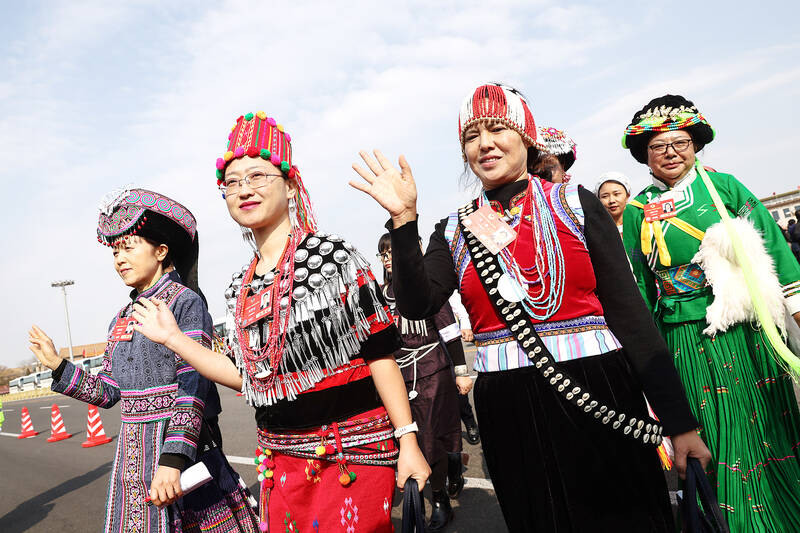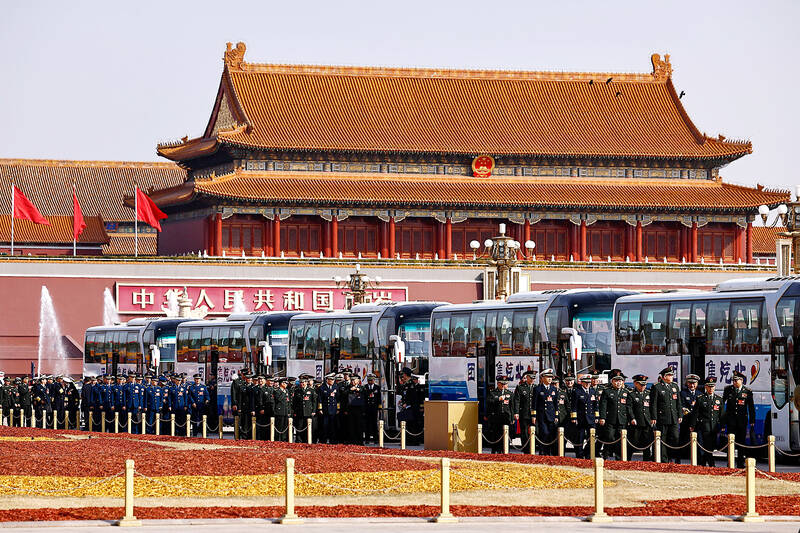China’s annual major political event gets underway this week, bringing together the nation’s top leaders and thousands of provincial leaders to endorse decisions already made by the all-powerful Chinese Communist Party.
The meetings and gathering during the National People’s Congress, expected to last for about a week, are still important. The rubber-stamp parliament retains an important function: to signal the priorities of the government for the coming year and to disseminate instructions to party members and officials across the country.
The messaging from leadership appears unchanged from previous years — stay the course on fostering innovation while also spurring domestic consumption.

Photo: EPA-EFE
The question will be how they balance those two goals, and will it be enough to reinvigorate the economy? And to what extent will the government buffer the impact of what might be another phase in the US-China trade war?
This year also marks the end of China’s current 5-year plan, and experts will be looking for clues on the government’s priorities for the next, 2026 to 2030 plan.
Here is what to watch for at this year’s event:

Photo: Reuters
What is China’s economic growth target?
The National People’s Congress kicks off on Wednesday, with Premier Li Qiang (李強), China’s top economic official, announcing the economic growth target for the year.
Analysts expect it to come in at around 5 percent — holding the same target as the previous two years, and slightly lower than the 5.5 percent target in 2022. This would be no small feat considering China is still grappling with a sluggish real estate sector and lackluster consumer spending.
Another uncertainty is trade tensions with the US under President Donald Trump, who last month slapped a 10 percent tariff on Chinese imports while an additional 10 percent comes into effect on Tuesday. Forecasters at the International Monetary Fund are projecting a lower 4.6 percent growth rate this year.
What are the government’s priorities?
A commentary last Friday from the official Xinhua News Agency indicated that priority would be placed on boosting domestic demand and promoting innovation in science and technology.
There’s also anticipation of more government support for the private sector to fuel growth.
Chinese President Xi Jinping (習近平) met last month with business leaders, including Alibaba founder Jack Ma (馬雲) and Huawei CEO Ren Zhengfei (任正非), signaling support for the private sector at the highest level of leadership. A draft bill is also to be deliberated during the Congress over making a fairer and more equitable business environment for the private sector.
China has already released a slew of measures to prop up the economy. Much of these have fallen short of hopes for a bigger stimulus, and analysts are tempering expectations on what to expect from the Congress.
“I would not expect anything ... to come out that will really meaningfully shift that policy away from industrial policy and towards boosting consumption in meaningful, sufficient ways,” said Jacob Gunter, lead analyst for the economics research team at the Mercator Institute for China Studies.
Instead, experts say leaders are staying the course on pushing for innovation that would boost China’s self-reliance.
The purpose of the economy is no longer to improve household incomes and expand the middle class, Gunter said.
“This is not a development-oriented economy,” he said. “It’s a geopolitically oriented economy, and technology and industry are way more important for that.”
Where is China’s diplomacy headed?
Li is expected to touch on foreign policy and Taiwan, but more attention will likely be on Foreign Minister Wang Yi (王毅).
His annual news conference, to be held later in the week, will be closely watched to decipher China’s stance on US-China relations under Trump. After the first 10 percent tariffs last month, China retaliated with a 15 percent tariff on American coal and liquefied natural gas, as well as 10 percent on crude oil, agriculture machinery and large-engine cars.
“Beijing’s response to Trump’s initial 10 percent tariffs was measured — restrained enough to signal openness to negotiations yet firm enough to demonstrate its willingness to escalate if necessary,” Neil Thomas and Jing Qian wrote in a report for the Asia Society Policy Institute.
They note that China’s president might use speeches in closed-door meetings during the Congress to send signals on bilateral relations, as he did two years ago when Xi named the US as leading “containment encirclement and suppressions” against China.
Also closely watched will be China’s relations with Russia and its position on the Ukraine war. At a recent Group of 20 foreign minister’s meeting in South Africa, Wang said a “window for peace is opening” in Ukraine, and that China supported “all efforts committed to peace, including the recent consensus reached by the United States and Russia.”
What does the National People’s Congress do?
The legislature is made up of nearly 3,000 delegates from China’s provinces, ministries, People’s Liberation Army, party organizations and various groups that represent workers and other interests.
Their role is largely ceremonial in that the body does not have any real power to decide on legislation. Any vote is usually unanimous or near-unanimous to formalize decisions already taken by Communist Party leaders behind closed doors.
Still, the Congress is a rare opportunity to see what the central government’s sees as priorities and goals, and the reports and speeches during it can give indications of the future direction of government policy.
An advisory body, the Chinese People’s Political Consultative Conference, will meet at the same time. Members include business leaders, athletes, academics, religious leaders and representatives of ethnic groups. The concurrent meetings of the two bodies are known as the Two Sessions.

Last week, the the National Immigration Agency (NIA) told the legislature that more than 10,000 naturalized Taiwanese citizens from the People’s Republic of China (PRC) risked having their citizenship revoked if they failed to provide proof that they had renounced their Chinese household registration within the next three months. Renunciation is required under the Act Governing Relations Between the People of the Taiwan Area and the Mainland Area (臺灣地區與大陸地區人民關係條例), as amended in 2004, though it was only a legal requirement after 2000. Prior to that, it had been only an administrative requirement since the Nationality Act (國籍法) was established in

Three big changes have transformed the landscape of Taiwan’s local patronage factions: Increasing Democratic Progressive Party (DPP) involvement, rising new factions and the Chinese Nationalist Party’s (KMT) significantly weakened control. GREEN FACTIONS It is said that “south of the Zhuoshui River (濁水溪), there is no blue-green divide,” meaning that from Yunlin County south there is no difference between KMT and DPP politicians. This is not always true, but there is more than a grain of truth to it. Traditionally, DPP factions are viewed as national entities, with their primary function to secure plum positions in the party and government. This is not unusual

More than 75 years after the publication of Nineteen Eighty-Four, the Orwellian phrase “Big Brother is watching you” has become so familiar to most of the Taiwanese public that even those who haven’t read the novel recognize it. That phrase has now been given a new look by amateur translator Tsiu Ing-sing (周盈成), who recently completed the first full Taiwanese translation of George Orwell’s dystopian classic. Tsiu — who completed the nearly 160,000-word project in his spare time over four years — said his goal was to “prove it possible” that foreign literature could be rendered in Taiwanese. The translation is part of

The other day, a friend decided to playfully name our individual roles within the group: planner, emotional support, and so on. I was the fault-finder — or, as she put it, “the grumpy teenager” — who points out problems, but doesn’t suggest alternatives. She was only kidding around, but she struck at an insecurity I have: that I’m unacceptably, intolerably negative. My first instinct is to stress-test ideas for potential flaws. This critical tendency serves me well professionally, and feels true to who I am. If I don’t enjoy a film, for example, I don’t swallow my opinion. But I sometimes worry